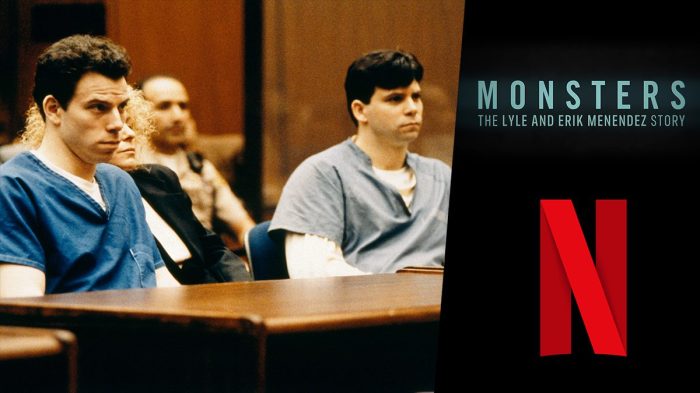Erik Menendez Trashes ‘Ruinous Character Portrayals’ in Netflix’s Monsters: ‘Is the Truth Not Enough?’ The Menendez brothers, infamous for their 1989 murder of their parents, are back in the spotlight. This time, it’s not a courtroom drama, but a Netflix documentary titled “Monsters: The Menendez Brothers.” The series, which dives into the shocking crime and its aftermath, has sparked outrage from Erik Menendez, who vehemently criticizes the portrayal of him and his brother Lyle in the docuseries.
He argues that the show misrepresents their story and paints them as villains without considering their perspective.
The Menendez brothers case, a gripping tale of wealth, family dysfunction, and a shocking act of violence, has captivated the public for decades. The trial, which was broadcast live on national television, was a media frenzy, and the public was deeply divided on the brothers’ guilt or innocence.
The Netflix documentary, “Monsters,” seeks to revisit the case and offer a fresh perspective. However, Erik Menendez claims that the documentary falls short of presenting the truth, and he takes issue with the way the show depicts him and his brother.
Erik Menendez’s Criticism of Netflix’s “Monsters”
Erik Menendez, one of the brothers convicted of murdering their parents in 1989, has publicly criticized Netflix’s docuseries “Monsters: The Lyle and Erik Menendez Story.” Menendez claims the series presents a biased and inaccurate portrayal of him and his brother Lyle, focusing on sensationalism rather than truth.
He argues that the series fails to adequately explore the complexities of their case and paints a picture of them as cold-blooded killers without delving into the abuse they claim to have suffered at the hands of their parents.
Erik Menendez’s Specific Criticisms
Erik Menendez’s criticism centers on several key points:
- Misrepresentation of the Abuse Allegations:Menendez asserts that the series downplays or dismisses the abuse allegations he and his brother made against their parents, Joseph and Kitty Menendez. He argues that the series presents the abuse as a minor factor in their crimes, while failing to explore the depth and impact of the alleged abuse.
- Lack of Context:Menendez contends that the series fails to provide adequate context for the events leading up to the murders. He argues that the series focuses on the murders themselves without delving into the family dynamics, the brothers’ troubled childhood, and the alleged abuse that he believes contributed to their actions.
- Sensationalized Portrayal:Menendez criticizes the series for relying on sensationalism and focusing on the most dramatic aspects of the case. He argues that the series prioritizes entertainment over accuracy, presenting a biased and incomplete picture of the events.
- Limited Perspectives:Menendez points out that the series primarily relies on the perspectives of law enforcement and prosecution, neglecting to give voice to his and his brother’s perspectives. He believes that this one-sided approach creates a distorted narrative.
Language and Tone of Erik Menendez’s Criticism
Erik Menendez has expressed his criticism in a measured and articulate manner. He has used strong language to highlight the inaccuracies and biases he perceives in the series, but he has refrained from personal attacks or inflammatory rhetoric. He has consistently maintained that his primary goal is to ensure that the truth of his case is accurately portrayed.
Comparison and Contrast of Erik Menendez’s Perspective and the Portrayal in “Monsters”
The series “Monsters” presents a narrative that largely aligns with the prosecution’s case, focusing on the brothers’ financial motivations and their calculated planning of the murders. It portrays them as cold-blooded killers who ruthlessly executed their parents for financial gain.
In contrast, Erik Menendez’s perspective emphasizes the alleged abuse he and his brother suffered at the hands of their parents. He claims that the abuse played a significant role in their actions, leading to a breakdown in their relationship with their parents and ultimately culminating in the murders.
He argues that the series fails to adequately explore this aspect of the case, painting a one-dimensional picture of him and his brother as solely driven by greed.
Monsters
The Netflix documentary series “Monsters: The Lyle and Erik Menendez Story” delves into the 1989 murders of José and Kitty Menendez, focusing on the trial and conviction of their sons, Lyle and Erik. It aims to present a multi-faceted perspective on the case, exploring the complexities of the crime, the legal proceedings, and the impact on the Menendez family.
The Documentary’s Central Arguments and Themes
“Monsters” presents several central arguments and themes, challenging viewers to consider the case beyond a simple narrative of “evil sons” murdering their parents. The documentary highlights the dysfunctional family dynamics, the potential for abuse within the Menendez household, and the psychological impact of these factors on Lyle and Erik.
It also examines the legal strategies employed by both the prosecution and defense, raising questions about the fairness of the justice system and the role of media influence in shaping public perception.
Key Sources and Perspectives
The documentary features a range of sources and perspectives, providing a comprehensive view of the case.
- Interviews with Lyle and Erik Menendez, offering their personal accounts of the events and their experiences during the trial.
- Interviews with key figures involved in the case, including lawyers, detectives, and journalists, providing insights into the legal proceedings and the media coverage.
- Archival footage and photographs, offering a glimpse into the lives of the Menendez family and the events surrounding the murders.
- Expert analysis from psychologists and legal scholars, providing insights into the psychological factors that may have contributed to the crime and the legal complexities of the case.
The Documentary’s Impact and Reception, Erik Menendez Trashes ‘Ruinous Character Portrayals’ in Netflix’s Monsters: ‘Is the Truth Not Enough?’
“Monsters” has sparked significant discussion and debate, reigniting public interest in the Menendez case.
- The documentary has been praised for its nuanced approach, offering a more complex understanding of the case than previous media portrayals.
- Some critics have argued that the documentary is too sympathetic to the Menendez brothers, while others have praised its exploration of the potential for abuse within the family.
- The documentary has also generated renewed interest in the legal and ethical issues surrounding the case, prompting discussions about the role of the justice system and the impact of media influence.
The Truth and the Narrative
Erik Menendez’s criticism of “Monsters” centers around the documentary’s portrayal of the truth. He contends that the narrative presented by the filmmakers is biased and incomplete, failing to capture the full complexity of his story and the events leading up to the murders of his parents.The documentary “Monsters” attempts to present a balanced view of the Menendez brothers’ story, exploring both their claims of abuse and the prosecution’s case against them.
However, Erik Menendez argues that the documentary leans heavily on the prosecution’s perspective, neglecting crucial details that support his version of the truth.
The Discrepancies Between Erik Menendez’s Account and the Documentary’s Narrative
The documentary “Monsters” relies heavily on the prosecution’s case, which paints a picture of the Menendez brothers as cold-blooded killers who planned and executed the murders of their parents for financial gain. Erik Menendez argues that this narrative ignores the years of abuse he endured at the hands of his father, which he claims ultimately led to the tragic events.
- The Nature and Extent of Abuse:Erik Menendez maintains that the documentary minimizes the severity of the abuse he suffered, focusing primarily on the financial motive for the murders. He argues that the documentary fails to adequately address the emotional and psychological impact of the abuse on him and his brother, which he believes played a significant role in their actions.
- The Brothers’ Relationship:Erik Menendez contends that the documentary fails to accurately depict the close bond he shared with his brother Lyle. He argues that the documentary portrays them as estranged and disconnected, overlooking the shared trauma and emotional support they provided each other during their difficult childhood.
- The Defense’s Perspective:Erik Menendez criticizes the documentary’s limited focus on the defense’s arguments, which centered around the impact of abuse on their mental state and actions. He argues that the documentary overlooks crucial evidence presented by the defense, which he believes could have swayed public opinion and influenced the jury’s verdict.
Do not overlook the opportunity to discover more about the subject of Austin PD promotes Osborne to sergeant.
Challenges of Portraying a Complex Case in a Documentary Format
The Menendez case is undeniably complex, involving multiple layers of legal proceedings, psychological evaluations, and conflicting narratives. This complexity presents significant challenges for filmmakers seeking to portray the case in a documentary format.
- Balancing Perspectives:Documentaries often struggle to strike a balance between presenting multiple perspectives and avoiding bias. In the Menendez case, the filmmakers faced the difficult task of presenting both the prosecution’s case and the brothers’ claims of abuse without appearing to favor one side over the other.
- Limited Time and Scope:Documentaries typically have a limited runtime, which can restrict the amount of information and detail they can cover. This limitation can make it challenging to fully explore the complexities of a case like the Menendez murders, potentially leading to oversimplification or omission of crucial information.
- The Impact of Public Opinion:Public opinion can heavily influence the way a case is portrayed in a documentary. In the Menendez case, the brothers’ celebrity status and the graphic nature of the crime undoubtedly played a role in shaping public perception and influencing the narrative presented by the filmmakers.
Potential Biases and Limitations of the Documentary’s Approach
While “Monsters” attempts to present a balanced view of the Menendez case, the documentary’s approach inevitably reflects the filmmakers’ perspectives and choices. This can lead to potential biases and limitations in the narrative presented.
- Selection of Sources:The documentary relies heavily on interviews with law enforcement officials, prosecutors, and journalists who were involved in the case. While these sources provide valuable insights, they may also have a vested interest in upholding the prosecution’s perspective or maintaining their own reputations.
- Narrative Structure:The documentary’s narrative structure, including the order of events and the emphasis placed on different aspects of the case, can influence the audience’s interpretation of the events. For example, by focusing on the financial motive for the murders early in the documentary, the filmmakers may inadvertently lead viewers to prioritize this aspect over other potential explanations.
- Lack of Context:The documentary may not provide sufficient context for the events it depicts, potentially leading to misunderstandings or misinterpretations by the audience. For instance, the documentary may not fully explore the social and cultural factors that contributed to the abuse Erik Menendez experienced, leaving viewers with a limited understanding of the complexities of the case.
The Impact of Media Portrayals: Erik Menendez Trashes ‘Ruinous Character Portrayals’ In Netflix’s Monsters: ‘Is The Truth Not Enough?’
The way the media portrays events, particularly high-profile cases like the Menendez brothers trial, can significantly influence public perception and even impact the course of legal proceedings. While the media aims to inform the public, its portrayals can sometimes be inaccurate, biased, or even sensationalized, leading to potential consequences for individuals involved.
The Influence of Media Portrayals on Public Opinion and Legal Proceedings
Media portrayals can shape public opinion by presenting a particular narrative, often through selective information, emotional appeals, and framing. This can lead to biases and prejudices, influencing how individuals perceive the case and the individuals involved.
- For example, the initial media coverage of the Menendez brothers case often portrayed them as cold-blooded killers, focusing on the gruesome details of the murders. This narrative, reinforced by sensationalized headlines and graphic imagery, likely contributed to a negative public perception of the brothers, making it challenging for them to receive a fair trial.
- On the other hand, the media’s portrayal of the brothers’ childhood abuse, later presented in court, shifted public opinion, generating sympathy and raising questions about their mental state and the potential for diminished capacity. This shift in public perception highlights how media coverage can influence the narrative surrounding a case, potentially impacting jury selection and public perception of the defendants.
Closing Notes

The controversy surrounding the “Monsters” documentary highlights the complexities of portraying a complex and controversial case in a documentary format. The documentary’s impact on public opinion and its influence on the ongoing debate about the Menendez brothers’ guilt or innocence are significant.
Erik Menendez’s criticism raises important questions about the role of media in shaping public perception and the challenge of finding truth in a narrative that is often shaped by bias and perspective. Ultimately, the “Monsters” documentary leaves viewers with more questions than answers, prompting them to consider the intricacies of the Menendez brothers case and the ongoing debate about justice and accountability.
Commonly Asked Questions
What is the “Monsters” documentary about?
The “Monsters” documentary on Netflix explores the Menendez brothers case, focusing on the murder of their parents and the subsequent trial.
What are Erik Menendez’s main criticisms of the “Monsters” documentary?
Erik Menendez argues that the documentary misrepresents him and his brother Lyle, portraying them as villains without considering their perspective. He claims the show doesn’t present the full truth of their story.
What is the public’s reaction to the “Monsters” documentary?
The “Monsters” documentary has sparked a lot of discussion, with some viewers supporting the show’s perspective and others siding with Erik Menendez’s criticism.
How has the Menendez brothers case impacted public opinion?
The Menendez brothers case has been a source of intense public debate for decades, with strong opinions on both sides regarding the brothers’ guilt or innocence. The case has also sparked discussions about domestic abuse, the role of wealth in crime, and the power of media influence.
 CentralPoint Latest News
CentralPoint Latest News




